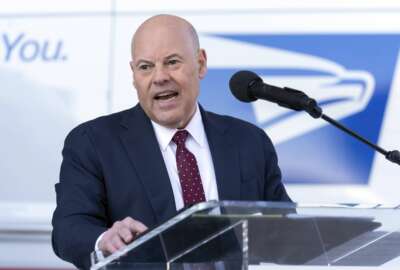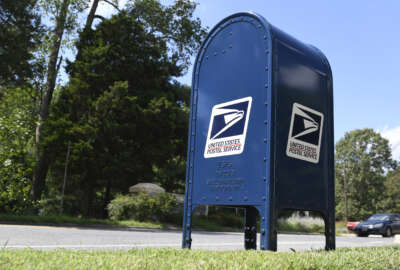House lawmakers probe USPS extreme heat protections following letter carrier’s death
More than a dozen House lawmakers are calling on the Postal Service to protect its workforce from extreme heat.
More than a dozen House lawmakers are calling on the Postal Service to protect its workforce from extreme heat.
House Oversight and Accountability Committee Ranking Member Jamie Raskin (D-Md.) is leading lawmakers who are looking for answers, after a letter carrier in Texas died while delivering mail in a recent heat wave.
Lawmakers, in a letter sent last Friday, asked Postmaster General Louis DeJoy what steps USPS is taking to protect its workforce from extreme heat.
Lawmakers are asking USPS whether letter carriers can start their workdays earlier, to reduce time spent working in the heat.
Eugene Gates Jr., a 66-year-old letter carrier in Texas, died June 20 while delivering mail during a heat wave, with temperatures as high as 115 degrees.
“His unnecessary and untimely death was likely preventable and a stark reminder of the costs of the global climate emergency and the effect of more frequent and damaging extreme weather events,” lawmakers wrote.
The National Association of Letter Carriers, which represented Gates, said he collapsed and died in a customer’s yard while delivering mail. Gates, an Army veteran, served as a letter carrier for 36 years.
“Eugene was a dedicated letter carrier with a long and successful Postal Service career,” NALC National President Brian Renfroe said in a statement. “He will be greatly missed.”
USPS spokesman David Partenheimer said the agency received the letter and will respond to lawmakers.
“The safety of our employees is a top priority and the Postal Service has implemented a national Heat Illness Prevention Program (HIPP) for all employees,” Partenheimer said.
The HIPP is triggered between April 1 through October 31, and at any other time when the National Weather Service indicates that the outdoor heat index temperatures will exceed 80 degrees Fahrenheit during the work day.
In connection with the HIPP, USPS provides mandatory heat-related and other safety training and instruction to all employees.
Partenheimer said the agency reminds letter carriers to stay hydrated, wear appropriate clothing, including hats, get in the shade whenever possible, and take enough water and ice with them out on their routes.
Letter carriers, he added, should contact 911 in the event they begin experiencing any symptoms of heat exhaustion or heat stroke.
NALC said it worked with USPS to create the HIPP. A union memo outlines the symptoms of someone experiencing heat stroke, heat exhaustion, heat cramps or heat rash.
Renfroe said all letter carriers and supervisors were required to receive HIPP training by April.
“Unmitigated excessive heat can cause heat stress, often resulting in serious illness or death. Unfortunately, we have seen far too many examples of this over the last several years, including in 2023. This hazard becomes a greater threat every year, as science shows that temperature and heat indices are steadily increasing,” Renfroe wrote.
Renfroe said any letter carrier that has not yet received this training should contact their shop steward, branch officer or national business agent as soon as possible, so the matter may be investigated and a grievance filed if necessary.
“The safety and health of our members is, and always will be, the top priority of all the members of the NALC. Together, we will continue our fight to make our jobs safer and protect our members from the ever-increasing hazard of excessive heat.
Lawmakers are also asking USPS about plans to address aging delivery vehicles that don’t have air conditioning.
The Postal Service is placing orders for a next-generation delivery vehicle fleet that’s mostly electric. But USPS says those new vehicles won’t start appearing on delivery routes until mid-2024.
Lawmakers, however, said USPS needs to give “immediate attention” to the issue.
“With the increase in extreme heat indexes across the country, we have serious concerns that the Postal Service’s failure to invest in and fix existing vehicle air-conditioning units and failure to effectively implement policies to reduce employee exposure to extreme conditions place our letter carriers at risk, especially in the coming months.”
Vicki Stephen, executive director of the USPS Next Generation Delivery Vehicle program, told members of the House Oversight and Reform Committee last year that USPS has an “urgent need” to replace its fleet.
Stephen told the committee that many of USPS’s current 190,000 delivery vehicles lack basic features, such as air conditioning, airbags and anti-lock brakes.
NALC, in a separate statement, said the union has participated in extensive litigation with USPS and the Occupational Safety and Health Administration (OSHA)
“Over the last decade, NALC has fought fiercely in a number of forums to protect letter carriers by insisting that the Postal Service create and enforce a comprehensive heat illness prevention program (HIPP) that protects our members by mitigating the hazard posed by excessive heat.”
The Center for Public Integrity reported in 2019 that OSHA cited USPS for exposing about 900 employees to the risks of heat-related illness and death since 2012.
OSHA cited USPS in January 2019 following the heat-related death of a Southern California mail carrier.
The employee suffered hyperthermia while delivering mail in July 2018, when the outdoor temperature reached 117 degrees.
“The U.S. Postal Service knows the dangers of working in high-heat conditions and is required to address employee safety in these circumstances,” said OSHA Oakland Area Office Director Amber Rose. “USPS is responsible for establishing work practices to protect mail carriers who work outdoors from the hazards of extreme temperatures.”
An administrative law judge in 2020 rejected five heat-related OSHA citations against USPS.
The cases stemmed from seven letter carriers working in five different cities during the summer of 2016. In each incident, the letter carriers began feeling ill while delivering mail and received treatment at a hospital or urgent care clinic.
Administrative Law Judge Sharon Calhoun ruled that OSHA didn’t prove that USPS didn’t adequately protect letter carriers from excessive heat exposure. Calhoun, in her ruling, canceled proposed fines totaling more than $511,000.
Copyright © 2025 Federal News Network. All rights reserved. This website is not intended for users located within the European Economic Area.
Jory Heckman is a reporter at Federal News Network covering U.S. Postal Service, IRS, big data and technology issues.
Follow @jheckmanWFED





